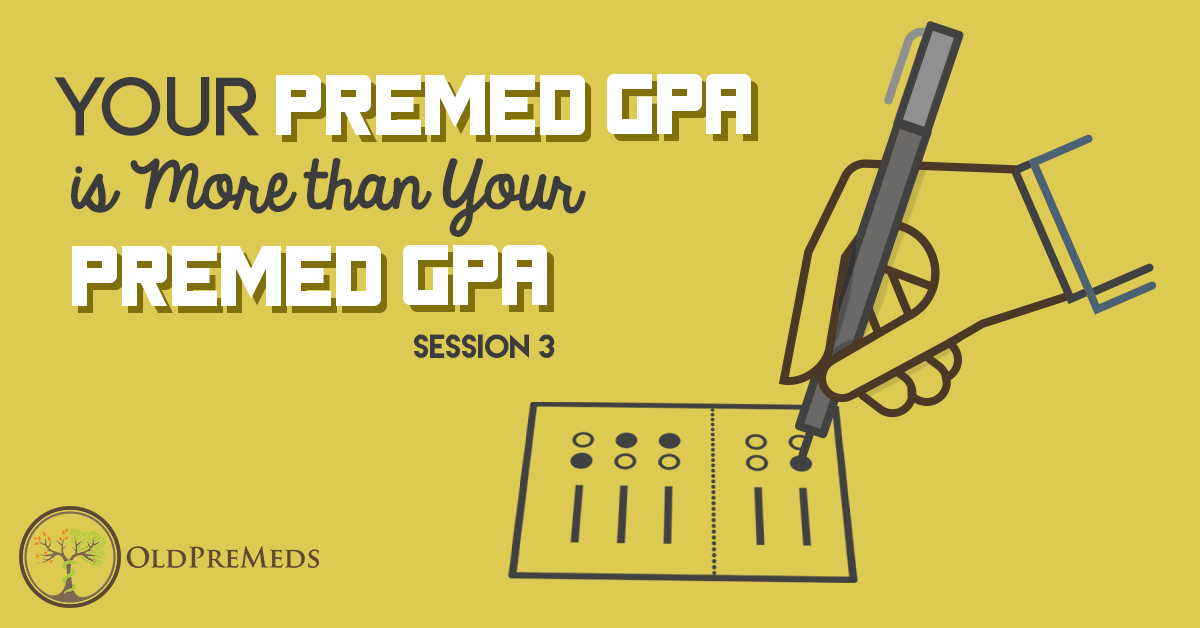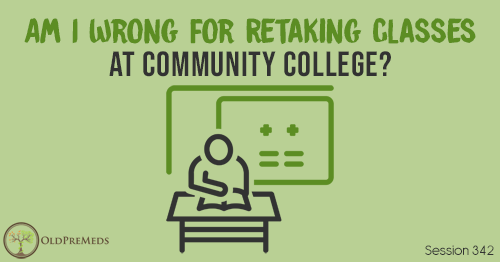Session 3
Today we answer a question from a nontraditional student with a low GPA who wants to apply to medical school.
In answering the question, we discuss how medical schools look at your GPA—whether they care about cumulative GPA, science GPA, your recent grades vs earlier years, and so forth.
Listen to this podcast episode with the player above, or keep reading for the highlights and takeaway points.
OldPreMeds Question of the Week:
As usual on the OldPreMeds Podcast, our question is taken from the Nontrad Premed Forum.
Our student this week wants to know if they should apply to DO schools or Caribbean MD medical schools. Which is a better choice, in terms of leading to more job prospects?
The student’s cumulative GPA is not going to be above 3.0 unless they take over 120 more hours of classes. But their science GPA is 3.5+.
DO schools or Caribbean MD medical schools. Which is a better choice?Click To Tweet[Related episode: DO vs Caribbean Medical School? What Should I Do?]
Your Premed GPA Is Not Just a Single Number
There is an assumption about GPA that it’s all a number. The truth is that it’s beyond a single number.
Your cumulative GPA is not the only thing the medical school admissions committee is going to look at. Other things they will look for are:
- Science vs. non-science
- Bio, Chem, Phys, and Math (BCPM) vs. others
- Grade trends
- Other additional degrees or coursework (post-bacc)
- Combined with the rest of your undergrad
- Reported as a separate line item
There are some medical schools where your postbac, graduate program, or last year or two of your undergraduate count as your official GPA for admissions purposes. Consider the “32-hour rule,” where certain medical schools only look at your most recent 32 credit hours to determine your GPA.
- Wayne State University
- Michigan State University College of Human Medicine
- Boston University Medical School
- Louisiana State University – New Orleans
The AAMC survey got 127 different replies from medical schools for what factors they consider. Therefore, medical schools don’t just look at one simple number for your GPA. Instead, they look at the overall whole picture.
Medical schools don't just look at one simple number for your GPA. They look at the whole picture.Click To TweetOther Ways to Strengthen Your Application with a Low GPA
- MCAT is the most efficient method to show that you can handle the work even with a low GPA.
- What MCAT Score Do I Need If I Have a Low GPA?
- Take an MCAT prep course a few hours a week for a few months and get a much better score.
- Put your application together in a more coherent, compelling, and concise manner to really convince the schools.
- Go through at least two application cycles before considering an offshore medical school such as in the Caribbean.
- Arrogance vs. overconfidence
- EC’s, personal statement, and secondaries can all strengthen your application so you have a better chance even with a low cumulative GPA.
[Related episode: My Initial GPA Was 1.8. Can I Still Get into Med School?]
Major takeaway from this episode
Cumulative GPA is not the be-all and end-all when applying to medical school. Schools will look at the different subjects, such as your science GPA. They’ll also look at the trends in your grades, whether they are improving or getting worse. Some schools will only evaluate your GPA based on your most recent credit hours.
The second part of this question, about Caribbean medical schools versus DO medical schools, will be tackled in our next episode!
Links and Other Resources
- Check out my Premed Playbook series of books (available on Amazon), with installments on the personal statement, the medical school interview, and the MCAT.
- Related episode: From a 2.7 Undergrad GPA to First-Year Medical Student.
- Related episode: Your MCAT and GPA Don’t Matter as Much as You Think.
- Need MCAT Prep? Save on tutoring, classes, and full-length practice tests by using promo code “MSHQ” at Blueprint MCAT (formerly Next Step Test Prep)!
Listen to Other Shows
[smart_podcast_player url=”http://oldpremedspodcast.libsyn.com/rss” color=”004075″ show_name=”OldPreMeds Podcast” ]












